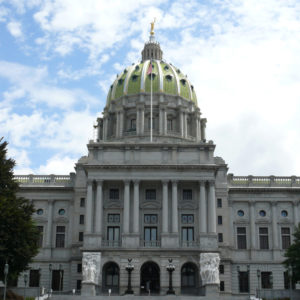Two weeks after Pennsylvania Gov. Josh Shapiro announced his cap-and-trade carbon credits system, House Republicans unveiled a vastly different energy legislative package.
Calling Shapiro’s proposals an “assault on Pennsylvanians’ wallets,” Republicans said their bills better promote energy savings. They include proposals that would redirect more than $520 million in Act 129 funds meant for energy efficiency and conservation programs into a credit on Pennsylvanians’ energy bills.
“Households across the commonwealth experience the impacts of high energy costs, as some are forced to reduce spending on food, medicine or other necessities in order to heat their homes,” said the group of representatives, which included Bucks County Rep. Joe Hogan. “This is unacceptable, especially when rising prices are attributable to government regulations and policies.”
Shapiro claims his Pennsylvania Climate Emissions Reduction Act (PACER) proposal would save customers $252 million via electricity rebates.
Hogan, however, argued the state needs to expand its property tax/rent rebate program.
“I have heard from too many of my neighbors to know more people need help,” he told DVJournal. “That is why I’m working to include utility costs in the income determination so that more people qualify and the rebates are larger for those that currently qualify.”
The state’s property tax/rent rebate program gives rebates to qualifying residents who make up to $45,000 a year.
Another bill would create a Health Savings Account type program for utility bills that allows employers to directly deposit part of a worker’s salary into a bank account without paying taxes.
Other proposals target the Department of Environmental Protection (DEP).
One bill called for an Independent Energy Advocate within the agency. Appointed by the governor, the advocate would encourage regulators to consider “broader energy implications” before issuing rules. Republicans said that that would protect grid reliability and energy affordability.
DEP could get a name change to the Department of Environmental Services to promote a more business-friendly culture. A bill description suggested that DEP workers see “themselves as…a necessary barrier to the expansion of business and development.”
A bill by Rep. James Struzzi II (R-Indiana) called for the creation of an independent agency to promote energy development. The head of the unnamed agency would review all proposed energy rules. Another bill by Struzzi tasked regulators with explaining how electricity prices might be negatively affected by new regulations.
Energy production facilities that were closed due to Pennsylvania’s stalled entry into the Regional Greenhouse Gas Initiative could also become eligible for Keystone Opportunity Zone-related tax breaks. A bill description said that would propose job growth and new development.
There’s also a bill suggesting that Pennsylvania, Ohio, and West Virginia team up for lobbying efforts before PJM Interconnection officials. The states are the top three energy producers in the PJM Interconnection-run power grid.
Energy and manufacturing groups hailed the bills.
“It’s refreshing to see Pennsylvania policymakers focused on a pro-growth, pro-production, pro-consumer agenda,” Carl A. Marrara, Vice President of Government Affairs for the Pennsylvania Manufacturers’ Association told DVJournal. “Nationally, Pennsylvania is the number one exporter of electricity, number two producer of natural gas, number three producer of coal; we are a global energy leader and it’s time we act like it.”
Marcellus Shale Coalition President David Callahan argued that Pennsylvania policymakers need to remember how the state benefited from natural gas. He told DVJournal that natural gas reduced carbon emissions 46 percent from the power sector and saved consumers nearly $9 billion last year compared to 2008.
Republicans are the minority in the House but control the Senate. A Senate Republican Caucus spokesperson told DVJournal that they share a common objective with House Republicans on energy policy.
Shapiro’s office did not return an email asking for comment.

